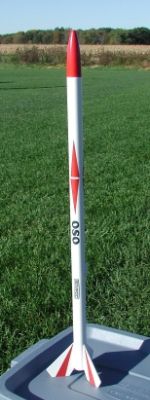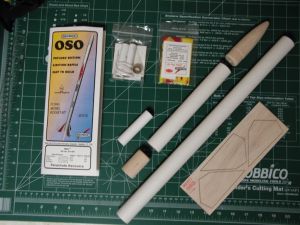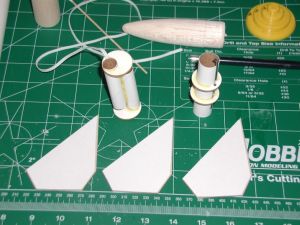| Construction Rating: | starstarstarstarstar_border |
| Flight Rating: | starstarstarstarstar_border |
| Overall Rating: | starstarstarstarstar_border |
| Diameter: | 1.17 inches |
| Manufacturer: | Semroc  |
| Skill Level: | 1 |
| Style: | Clone, Sport |

Brief:
The OSO is another superb Retro-Repro kit from Semroc. This rocket is based on the original Oso kit by Flight
Systems, Inc but with several improvements. While the rocket appears not much more that a 3FNC kit, it does contain a
payload section and an ejection baffle. At a finished length of just over 30”, the rocket is a nice additional to
anyone's fleet. I ordered the rocket of the Semroc website and it was delivered to my home quickly and securely
packaged.
Construction:
The OSO kit is rated a skill level 1 kit from the manufacturer. I would probably rate it at a 1.5 if you have never
built a rocket before. The instructions are easy to follow and well organized with great illustrations. All the
components in this kit were typical high quality material that I have come to expect from Semroc.
The rocket is assembled like most other kits. I built it to stock with the exception of papering the fins. They are quite thin and really flexible. It would be easy for them to break during construction if you are not careful. My only other real grip with the construction is the way Semroc instructs you to mark where the fins go on the body. Instead of having a paper wrap that fits on the tube, you have to hold the rocket securely down against the instruction sheet fin guide to place the marks around the body tube. This is kind of awkward.
 The only other thing out of the ordinary is the construction and installation of the baffle. The system
uses two smaller tubes and a pair of centering rings to form a chamber for the ejection particle to get trapped so
there is no need for recovery wadding. You will also be attached the shock cord to one end of the baffle. You must make
sure that the two centering rings dry symmetrically so that the assembly will easily fit into the main body tube. The
baffle needs to be inserted into the body tube about 4-5” from the top of the tube. Be sure to use glue that will
not dry too quickly so that it can be put all the way in place. I appreciate the fact the Semroc includes a long cotton
swab to be used as a glue applicator for this step.
The only other thing out of the ordinary is the construction and installation of the baffle. The system
uses two smaller tubes and a pair of centering rings to form a chamber for the ejection particle to get trapped so
there is no need for recovery wadding. You will also be attached the shock cord to one end of the baffle. You must make
sure that the two centering rings dry symmetrically so that the assembly will easily fit into the main body tube. The
baffle needs to be inserted into the body tube about 4-5” from the top of the tube. Be sure to use glue that will
not dry too quickly so that it can be put all the way in place. I appreciate the fact the Semroc includes a long cotton
swab to be used as a glue applicator for this step.
Finishing:
The finish for this rocket is quite simple. The instructions cover how to get a professional looking rocket with a
little elbow grease. Since I papered the fins and the balsa nose cone was extremely smooth with very little wood grain
ridges, I primed the rocket with Kilz Original spray primer. I sanded it and then applied a couple coats of gloss
white. The color scheme in the instructions has an optional red nose cone which I decided to do. To finish the rocket,
you apply the decals. Semroc's decals are probably the best I have ever worked with from a vendor. They go on so easy
with no worries of tears.
Construction Rating: 4 out of 5

Flight:
This rocket can be launched on 18mm A, B, and C motors. For the first flight I chose a B6-4. The rocket went straight
up off the launch pad. The tip of the rocket was pointing down when the parachute ejected. There was evidence that the
two rocket parts snapped back into each other on ejection. This is described in the Recovery section of the review.
Other than that I was very satisfied with the flight.
Recovery:
The rocket uses a 12" plastic parachute for recovery which is fine for this size rocket. As mentioned earlier,
the baffle is the rocket eliminates the need for recovery wadding. When building the rocket I was worried about the
length of the shock cord. It is about 24” long with 6” of it used inside the body tube. As a result from the
upper body tube snapping back into the lower rocket tube, there was a dent in the balsa coupler. This happened a second
time with the next launch too.
Flight Rating: 4 out of 5
Summary:
I like the components, looks, and performance of this rocket. I definitely will increase the shock cord length before
the next flight. I would recommend this to a rocket beginner or veteran looking for something different in a kit. The
baffle allows you to quickly prep the rocket for the next flight. It is well worth the price of $17.50.
PROs: Baffle, payload section, improved OOP kit
CONs: Shock cord length, fin marking guide
Overall Rating: 4 out of 5
Other Reviews
- Semroc Oso By Chan Stevens (September 30, 2007)
Brief: When you buy a Semroc "retro-repro", you're buying a little piece of rocketry nostalgia. According to the introduction included in the instructions, the OSO was originally introduced by FSI in 1967 and listed for $4. The updated Semroc version uses laser-cut balsa fins instead of plywood, an engine hook, and also includes a neat little baffle system that ...
 |
 |
Flights
 |
 |